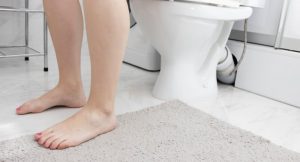Sleep Disorders 101: Nocturia
January 29, 2021

If the need to urinate has you running to the bathroom multiples per night, you may be one of 40 million Americans unknowingly living with nocturia. Nocturia is considered one of the most common sleep-related conditions impacting adults today, with an estimated 50 million American adults suffering from it (only 10 million people are actually diagnosed). The condition is defined by the NCBI as “the need for a patient to get up at night on a regular basis to urinate.” In order to receive an official diagnosis, a patient must consistently get out of bed at least two times during the night to urinate.
Do I Have Nocturia?
On top of the undeniable inconvenience caused by nocturia, serious side effects that result from consistent sleep disturbances can pose significant threats to the physical and mental well-being of those affected, as well as their sleep partners. The first step to figuring out if you’re suffering from nocturia is by evaluating daily disturbances to your everyday life.
As you now know, the condition’s primary indicator is excessive urination during the night; however, there are many symptoms of nocturia that result from receiving an inadequate amount of sleep. These include daytime disturbances due to exhaustion, drowsiness, fatigue, and cognitive dysfunction. A study from 2019 found that sleep deprivation doubles the odds of making placekeeping errors and triples the likelihood of distraction.
Research shows that not getting at least seven hours of sleep consistently over a 10-year period of time can also have long-term health consequences. Due to the impact of consistent sleep disturbances, nocturia is associated with obesity, diabetes, glucose intolerance, heart disease, hypertension, anxiety, and depression, all of which come with their own negative health consequences and risk factors.
Because nocturia is an associated condition of a larger issue, it’s essential that you divulge your challenges to your primary care doctor and/or sleep physician if they are not already aware. The only way to receive a proper diagnosis for any sleep and/or urinary disorder is by laying all your cards on the table.
Common Misdiagnoses
Despite the prevalence of nocturia in Americans, it frequently goes unreported or misdiagnosed altogether, leaving time for symptoms to evolve before treatment is sought. Many adults believe this is a “normal” part of aging and therefore don’t bring up their nighttime urination to their doctor. Physicians also commonly confuse nocturia with overactive bladder (OAB) or benign prostatic hyperplasia (BPH).
The frequent, sudden, and sometimes uncontrollable urge to urinate during both the day and night is distinctive to OAB. Nocturia, however, occurs only during sleep. BPH, on the other hand, is a bit unique, as nocturia is actually a specific symptom of BPH. Those who suffer from BPH, though, also experience additional symptoms such as difficulty urinating and being unable to fully empty their bladder.
Causes of Nocturia
There are a handful of reasons an individual may experience nocturia. Sometimes it’s as simple as consistently consuming too much liquid before bed. For this reason, nocturia is a common symptom of alcoholism. Other medical conditions such as high blood pressure, heart disease, vascular disease, diabetes mellitus, diabetes insipidus, and bladder tumors are also associated with causing nocturia. Additionally, some causes of nocturia can depend on gender-related health conditions. Women may develop symptoms of nocturia as a result of menopause, childbirth, or pelvic organ prolapse. In men, prostatic disease, prostate enlargement, and prostate tumors are known to cause nocturia.
Medical health conditions are not the only cause linked to nocturia. Neurologic diseases like Alzheimer’s, dementia, and Parkinson’s can also cause nocturia, as can suffering from sleep disorders such as insomnia or obstructive sleep apnea. Fortunately, if treatment for the underlying condition is available and utilized, the symptoms of nocturia should subside as a result.
Treatment

While the ideal outcome of nocturia treatment is to completely rid a patient of the condition, sometimes that’s simply not obtainable, depending on its severity. A recommended goal is to reduce nighttime nocturia disturbances by 50%.
The first step on the path to restful sleep is to schedule an appointment with your doctor or sleep specialist. If you do not currently have a sleep specialist, your general practitioner can refer you to one. Prior to your first visit, keep three days worth of notes of when you consume liquid, when you pee, and how often you wake up during the night to pee.
The following list contains common lifestyle changes to reduce the effects of Nocturia:
- Limit nighttime consumption of fluids | Limiting the amount of fluids consumed before bed can ease the overproduction of urine caused by nocturia.
- Avoid drinking alcohol | Alcohol consumption causes the kidneys to release more water, which in turn increases the need to urinate.
- Learn more about your medications | Some medications, like diuretics, can cause an increase in urine production. Ask your doctor if any of your medications include this side-effect, and if so, what time of day is best to take them.
- Rest during the day | To support your energy levels and cognitive function, take 30 minutes to rest or nap during the afternoon.
Once diagnosed with nocturia, your doctor may be able to prescribe medications that fight against the disorder. It is important to note that while medication has been proven to be effective, it does not cure nocturia. Once off the medication, it is likely that nocturia symptoms will return or worsen.
If you suspect that you’re suffering from nocturia or any other sleep-related disorder, our doors are open here at Sleep Dallas. Dr. Kent Smith has many years of experience treating sleep disorders. When you schedule a consultation today, our doctors will be able to assess your symptoms and create a treatment plan tailored to your needs.
